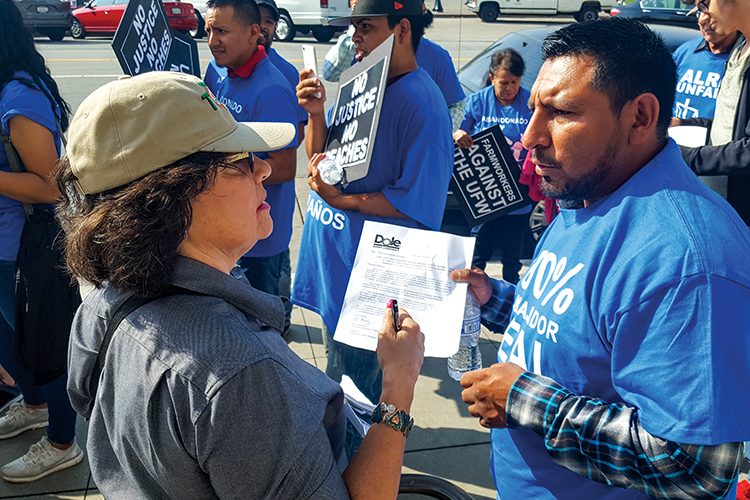Laurie Greene ’82 tells underreported stories in California’s agricultural heartland.
When Laurie Greene began interviewing farm employees and labor rights officials during a labor dispute in California’s Central Valley in 2013, something felt off.
Employees at Gerawan Farming, the nation’s biggest stone fruit producer, were not protesting the management — they were demanding decertification of the United Farm Workers (UFW) union. The protests were in response to an alleged cover-up by the UFW and the Agricultural Labor Relations Board (ALRB), two organizations created to protect their rights.
Over the next four years, the legal dispute raised questions about union abandonment, equal protection principles, the reach of legislative authority, accusations of government corruption, and the farm employees’ right to choose their own bargaining representation.
“It seemed like the employees’ rights were not being protected by UFW or the ALRB,” says Greene, founding editor of the agriculture news site California Ag Today.
As she began to piece together the story, Greene launched what would become a nine-part series investigating the network of allegations between Gerawan Farming, its employees, and California’s powerful union lobby. She would interview farm employees, lawyers, judges, and ALRB officials.
The series, titled Who Safeguards California Farm Workers’ Rights?, won a first-place journalism award from the Fresno County Farm Bureau in recognition of Greene’s extensive reporting on an issue that received little coverage in the wider region.
When she began reporting on the Central Valley in 2010, Greene had limited knowledge about the politics that play out in the area. Having spent most of her life working on the East Coast as a marketing communications manager, and then at the University of California, Davis as an academic personnel specialist, her experience with food revolved around the offerings at her grocery store. “My view of farming was very simplistic,” she says. When she married and moved to the Fresno area of the Central Valley with her husband, veteran agricultural reporter Patrick Cavanaugh, Greene began writing and editing articles for an agriculture news blog.
She quickly learned the complexities of the state’s agriculture industry. And she also learned that although California farms provide food to the entire world, the farmers’ and farm employees’ concerns and innovations were getting little airtime anywhere.
To address this dearth, Greene and Cavanaugh started California Ag Today in 2014. Initially an agriculture news blog, the two expanded it to include an online publication, a radio network, and social media with a small staff of reporters. They cover issues like industry innovations, sustainability, and how farms are responding to the challenges posed by recent droughts and labor shortages.
Greene says her time in Hamilton contributed to her success in this field. Her experience announcing the news on WRCU enabled her to venture into radio broadcasting. And Greene’s psychology major helped her “to fine-tune my analytical skills and to know that the story is not as simple as it may seem — it’s important to question and look for facts,” she says.
It was that critical eye that brought Greene to her labor piece, which shows a different side to the story of California’s farm employees and the UFW. A thread that emerged in Greene’s reporting was the changing face of the American worker: the typical farm hand may now be a second- or third-generation American who already reaps the benefits of years of hard work.
“[For the farm employees] to be told that they need to pay dues for promises they feel the management is already providing — health insurance, upward mobility, and good pay — is no incentive,” Greene explains.
In 2013, Gerawan workers cast votes to decide whether to leave the union, but the votes were impounded and their tally kept secret for nearly five years. Pick Justice, a group advocating against UFW, and Gerawan campaigned for those votes to be released and counted. This effort paid off in September 2018, when the ALRB certified a tally of the 2013 votes, revealing a nearly ten-to-one vote to leave the union.
The story of changing labor relations and the weakening role of unions has emerged in recent years as states consider “right-to-work” laws that shed the mandatory union dues and resultant collective bargaining protections in the dwindling number of industries that remain union strongholds.
“I believe it’s a crucial, underreported story,” Greene says. “We may yet write a book about it.”
In the meantime, Greene will follow the changing landscape for California farmers and share the stories behind the food we eat.

